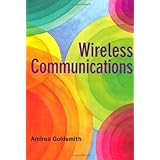
Average Reviews:

(More customer reviews)The book gives a fairly good breadth of subject, but is lacking in depth, and also does not give good intuitive sense of the subject. The book contains lot of typos and numerical errors that need to be addressed.
The book seems more intent on giving a lot of formulas and wireless situations, instead of enabling the student to think independently, and giving the tools for the student to think and derive the answers to issues.
The chapter on channel models for example gives a bunch of models for different fading conditions, but does not even clarify when the models apply, and how to apply them. After reading the chapter, I am not sure when each model applies and how to apply them.
Click Here to see more reviews about: Wireless Communications
Wireless technology is a truly revolutionary paradigm shift, enabling multimedia communications between people and devices from any location. It also underpins exciting applications such as sensor networks, smart homes, telemedicine, and automated highways. This book provides a comprehensive introduction to the underlying theory, design techniques and analytical tools of wireless communications, focusing primarily on the core principles of wireless system design.The book begins with an overview of wireless systems and standards. The characteristics of the wireless channel are then described, including their fundamental capacity limits. Various modulation, coding, and signal processing schemes are then discussed in detail, including state-of-the-art adaptive modulation, multicarrier, spread spectrum, and multiple antenna techniques. The concluding chapters deal with multiuser communications, cellular system design, and ad-hoc network design. Design insights and tradeoffs are emphasized throughout the book. It contains many worked examples, over 200 figures, almost 300 homework exercises, over 700 references, and is an ideal textbook for students. The book is also a valuable reference for engineers in the wireless industry. Andrea Goldsmith received her Ph.D. from the University of California, Berkeley, and is an Associate Professor of Electrical Engineering at Stanford University. Prior to this she was an Assistant Professor at the California Institute of Technology. She has also held positions in industry at Maxim Technologies and AT&T Bell Laboratories. She is a Fellow of the IEEE, has received numerous other awards and honors, and is the author of over 150 technical papers in the field of wireless communications.
Click here for more information about Wireless Communications

0 comments:
Post a Comment